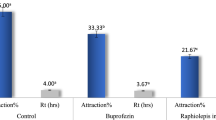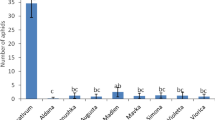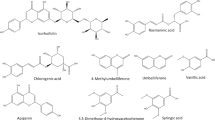Abstract
Barnes and Newton1 described tumours in alfalfa caused by a leaf-hopper. They concluded that these were induced by a substance in the insect's saliva, “probably some growth regulator rather than a virus”, and that individual plants vary in their sensitivity to this substance. Examinations of the balsam woolly aphid, Adelges piceae (Ratz.), have led to similar conclusions2.
This is a preview of subscription content, access via your institution
Access options
Subscribe to this journal
Receive 51 print issues and online access
$199.00 per year
only $3.90 per issue
Buy this article
- Purchase on SpringerLink
- Instant access to the full article PDF.
USD 39.95
Prices may be subject to local taxes which are calculated during checkout
Similar content being viewed by others
References
Barnes, D. K., and Newton, R. C., Nature, 199, 95 (1963).
Balch, R. E., Publ., 867, Science Service, Canada Dept. Agric. (1952).
Butler, E. J., Ann. App. Biol., 17, 175 (1930).
Steward, F. C., Sci. Amer., 209, 104 (1963).
Clark, J., and Bonga, J. M., Canad. J. Bot., 41, 165 (1963).
de Torok, D., and Thimann, K. V., Physiol. Plant, 14, 543 (1961).
Author information
Authors and Affiliations
Rights and permissions
About this article
Cite this article
BALCH, R., CLARK, J. & BONGA, J. Hormonal Action in Production of Tumours and Compression Wood by an Aphid. Nature 202, 721–722 (1964). https://doi.org/10.1038/202721a0
Issue date:
DOI: https://doi.org/10.1038/202721a0
This article is cited by
-
Resistant poplar genotypes inhibit pseudogall formation by the wooly poplar aphid, Phloeomyzus passerinii Sign
Trees (2014)
-
The interaction of pine scale with pines in Attica, Greece
European Journal of Forest Research (2010)
-
Cell hypertrophy in stems ofPinus halepensis infested byMatsucoccus josephi
Protoplasma (1988)
-
Consequences of host plant chemical and physical variability to an associated herbivore
Ecological Research (1988)
-
Simultaneous inhibition and induction of compression wood formation by morphactin in artificially inclined stems of Japanese larch (Larix leptolepis Gordon)
Wood Science and Technology (1983)



